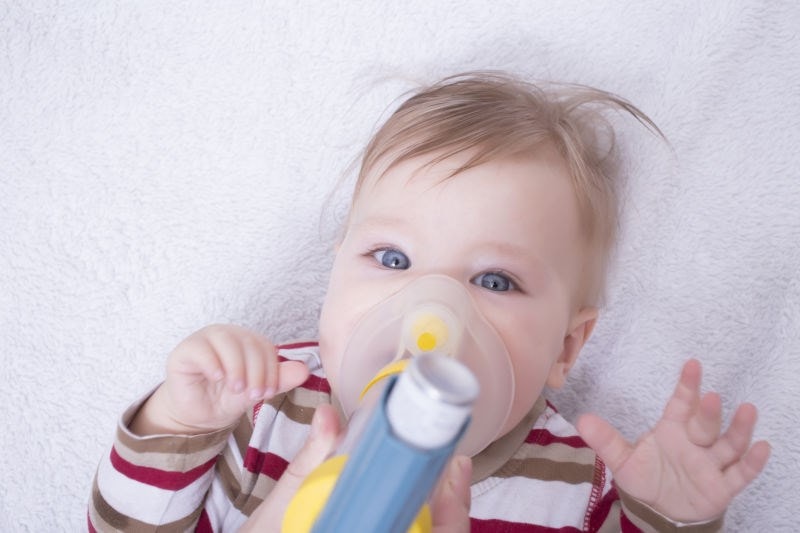Probiotic Potential for Asthma
This clinical trial evaluated the optimal time period and efficiency of taking a synbiotic containing Lactobacillus acidophilus Rosell-52, Bifidobacterium infantis Rosell-33, Bifidobacterium bifidum Rosell-71, Fructooligosaccharides (FOS)1. The trial was carried out specifically to evaluate the effectiveness of this synbiotic in controlling respiratory infections as well as allergy diseases (particularly wheezing) in young children.
Discussed within this artile:

For readers who may want some more details about asthma before I delve into the details of this interesting trial, please scroll down to ‘More about asthma’.
The Study
Now with all that said, let’s get a better look at this research.
The presence or lack of immunoglobulins could be indications for many diseases. Take IgA for example, this immunoglobulin is found in high concentration around the mucus membrane and the respiratory passage. It is commonly observed that children born with low IgA levels are at a higher risk of developing asthma and allergies. So the increase of total IgA levels as well as the presence of IgE were recorded throughout the trial.
78 hospitalised children under the age of 5, who had been hospitalised the year before for respiratory infections and wheezing, were involved in the trial. Of these subjects, 23% had asthma. The trial lasted for 9 months with follow-ups on the 6th and 9th month. The participants were split into 3 groups based on the symptoms they previously had;
- Group 1: previous respiratory infection and wheezing (with manifestation of wheezing once or a few times a month)
- Group 2: respiratory infection without wheezing
- Group 3: wheezing without respiratory infection (including asthma)

The study was a complete success and some fantastic results were recorded. The frequency of respiratory infections and wheezing in children under 5 years, with and without asthma, significantly decreased after 3 months of supplementing with the synbiotic formula. Children would typically experience an infection at least once per month, but after 3 months of taking this probiotic it became a rare occurrence; after 6 months, infection and wheezing rate was under control with no incidence recorded for any of the children. These results were maintained with supplementation 9 months into the trial.
There was also a progressive increase in the total IgA serum and a decrease in IgE serum which was maintained during supplementation with the synbiotic.
Check-ups have been planned to follow-up on the progress of these children 2 years after the trial and cessation of the synbiotic supplement, so we would definitely be keeping our eyes and ears peeled for the result of their long term finding.
Now you see why I couldn’t wait to share these results with you.
As I promised, below is some interesting information for those who want to know more about asthma.
More about asthma
Asthma has become an increasingly common inflammatory disease that affects the airways of the lungs. The World Health Organisation defines asthma as;
“A disease of the bronchial tubes in the lungs (the airways)” 2
Common symptoms of asthma include; wheezing, chest tightness, breathlessness, and a high-pitched whistling sound when breathing.
Now you might wonder where probiotics fit into this. Probiotic bacteria have been associated with stimulating the maturation of the immune system and a number clinical trials have also been carried out to explore the role of probiotics on allergies and allergy related diseases. For example, a 2011 clinical study on 90 formula fed babies found evidence for Bifidobacterium breve M-16V® in reducing the frequency of wheezing and noisy breathing in infants6.
Take a look at this related article for more information about allergies and probiotics.
A recent analysis of the Global Burden of Disease Study carried out between 2008 and 2010 showed that as many as 334 million people in the world may suffer from asthma 3.
There has been an increase in allergies in developed countries and this is believed to be due to over-cleanliness and antibiotics. The ‘Hygiene hypothesis’ suggests that our immune system needs to be challenged by bad bacteria as well as good, and the absence of such regular stimulation causes an inappropriate overreaction when pathogens or allergens are encountered 4.
The immune system of those with asthma reacts to both allergens and non-allergenic substances, causing the defence system to overreact which results in bronchial obstruction and inflammation 5.
The results of this latest study show an exciting potential for the role of probiotics in preventing and ameliorating the onset and symptoms of asthma. We will certainly be keeping an eye on future research.
Found this blog interesting? Then do have a look at the following related blogs on our website;
‘Gut bacteria, allergies and probiotics on BBC's Horizon’
‘Allergy sufferers could benefit from probiotics, says study’
Head over to the Probiotics Learning Lab for: ‘Probiotic supplements for the prevention of asthma?’
References
- Clinical trial/experimental study (consort compliant): Optimal time period to achieve the effects on synbiotic-controlled wheezing and respiratory infections in young children. Stojkovic, Andjelka and Simovic, Milan Aleksandra. 2016, Serbian Journal of Management, pp. 38-43.
- World Health Organization. WHO Asthma. WHO. [Online] January 19, 2017. http://www.who.int/respiratory/asthma/en/.
- Global Asthma Network. The Global Asthma Report. Auckland : Global Asthma Network, 2014.
- Various effects of different probiotic strains in allergic disorders:. Özdemir, Ö. . 2010, British Society for Immunology, Clinical and Experimental Immunology, pp. 295-302.
- The role of IgE in asthma. Yssel, H, et al. 1998, Clinical & Experimental Allergy, pp. 104-109.
- Van der Aa et al., "Synbiotics prevent asthma-like symptoms in infants with atopic dermatitis," Allergy , pp. 170-177, 2011.
Popular Articles
View all General Health articles-
General Health26 Nov 2025
-
General Health22 Sep 2023
-
General Health16 Mar 2023


